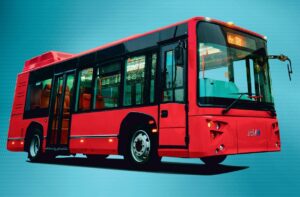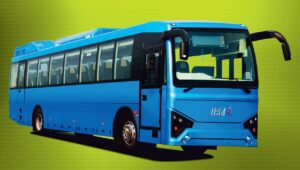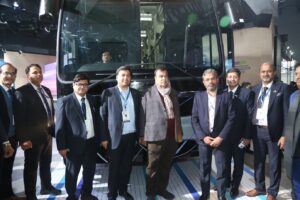In an exclusive interview with Bus Coach India Magazine, JBM Auto’s Vice Chairman & MD, Mr. Nishant Arya, highlighted the rapid transformation of India’s electric public mobility sector. As a leading player in the electric bus industry, he acknowledged that this growth is being driven by strong government support, increasing consumer awareness, and rising industry interest. However, he also pointed out the challenges that persist, including high initial costs, inadequate charging infrastructure, range anxiety, and supply chain limitations in battery production.
Q: The Bus segment has been one of the most remarkable growth stories, and arguably the only EV segment consistently showing strong signs of expansion. (What, in your view, has driven such impressive performance in this space)?
The growth of the electric bus segment can be attributed to several key factors. Governments worldwide are offering incentives and implementing policies to support clean transportation, driving the adoption of electric buses. Rapid technological advancements in battery performance, charging infrastructure, and overall efficiency have made electric buses more affordable and practical for cities. Lower long-term operating costs compared to traditional diesel buses, due to savings on fuel and maintenance, are another major driver. The global shift towards sustainability and cleaner air has also made electric buses an attractive solution for reducing emissions in urban areas.
At JBM Auto (JBM), we have consistently been at the forefront of innovation. We view our commitment to producing world-class electric buses as a way to contribute positively to both the environment and society. The combination of policy support, technological advancement, economic incentives, and environmental pressures has fuelled the strong expansion in the electric bus segment. This trend will continue to play a central role as we look towards a cleaner, more sustainable future.
Q: JBM has recently launched Four new electric buses at the Bharat Mobility Global Expo, how are these different to others in terms of technological advancement?
We’re proud of the four new electric buses we launched at the Bharat Mobility Global Expo. These buses represent a significant leap forward in technology and stand out in the market for several reasons:
- Enhanced Battery Technology: Our buses feature high-density lithium-ion batteries, offering a range of up to 1000 kms per day and can be charged under 1hour. This ensures longer operation on a single charge and reduces downtime, crucial for fleet operators.
- Advanced Regenerative Braking: Our electric buses include an advanced regenerative braking system, recovering energy during braking to increase efficiency and extend battery life. This technology also improves the overall driving experience and safety.
- Smart Connectivity: We’ve integrated IoT-based smart connectivity features, allowing real-time monitoring of vehicle health, battery status, and location. This enables fleet operators to manage buses more effectively, optimize routes, and predict maintenance needs.
- Passenger Comfort and Safety: Our new electric buses are designed for an enhanced passenger experience. With modern air conditioning, improved seating arrangements, and better accessibility features, we’ve prioritized comfort and safety for all passengers.
By focusing on these advanced features, we aim to set a new standard for electric buses in performance, efficiency, and passenger experience. At JBM, innovation drives our work, and these buses reflect our commitment to leading sustainable transportation solutions.
Q: How do you define the current electric bus market, and how is JBM looking for growth in 2025?

As a leading player in the electric bus industry, we recognize the rapid transformation in India’s electric public mobility sector. This growth is driven by strong government support, rising consumer awareness, and increasing industry interest. However, challenges persist, including high initial costs, insufficient charging infrastructure, range anxiety, and supply chain limitations for battery production. Addressing these barriers requires a comprehensive approach, incorporating strategic policy interventions, technological innovations, and large-scale infrastructure development. The Union Budget 2025 has taken steps to tackle these core issues, offering duty exemptions for EV battery production and removing import duties on critical minerals. These initiatives complement the Prime Minister’s E-Drive scheme, fostering an environment that supports green mobility expansion and aligns with India’s goal of enhancing cell and battery manufacturing capabilities.
At JBM, we recently celebrated a decade of contributions to public mobility, marking significant progress in advancing sustainable transportation solutions. A key achievement has been the successful deployment of over 1,800 electric buses across India, Europe, the Middle East, and Africa. In India, we have spearheaded the electrification of public transportation in cities such as Delhi, Bengaluru, Surat, and Ahmedabad, ensuring cleaner and more efficient urban mobility. To support this expansion, we have developed a comprehensive charging infrastructure ecosystem, enhancing the reliability and accessibility of electric buses.
JBM has also made substantial progress in scaling up electric bus production. We have established the world’s largest integrated electric bus manufacturing facility outside China, located in the Delhi-NCR region. This state-of-the-art facility has an annual production capacity of 20,000 electric buses, positioning us to meet the growing demand for sustainable transport solutions. Our strong order book, which includes over 10,000 electric buses deployed or under execution, further demonstrates our industry leadership.
Looking ahead, JBM aims to serve over 20 billion passengers and cover 3 billion e-kilometers within the next 3 to 4 years, while continuing to provide safe, reliable, and memorable transportation experiences.
Q: JBM had a phenomenal year in terms of volumes, revenues and profits. Could you recap 2024 and share the key drivers for success?
JBM has experienced a noteworthy year in 2024, with significant advancements in volumes, revenues, and profits. The company’s achievements can be attributed to well-planned decisions, favourable market conditions, and a steadfast commitment to innovation and quality.
Electric Bus Demand Surge: A key factor in JBM’s success has been the increasing demand for electric vehicle, particularly electric buses. As urban areas and nations focus on environmental sustainability and cleaner public transportation, the company has witnessed considerable growth in electric bus orders. The company’s capacity to provide high-quality, cost-effective, and technologically advanced electric buses has established JBM as a frontrunner in this expanding market.
Key Collaborations: Throughout the year, JBM established important partnerships with government bodies, fleet operators, and other industry stakeholders. These alliances facilitated large contract acquisitions, market expansion, and increased production capabilities. JBM’s position as a reliable partner in the global shift towards electric mobility has further strengthened its industry reputation.

Focus on Customer Needs: JBM’s approach has consistently prioritized understanding and addressing specific customer requirements. By offering customized solutions and exceptional service, the company has cultivated enduring partnerships and enhanced customer loyalty, contributing to its growth. The year 2024 has demonstrated that JBM’s dedication to innovation, operational efficiency, and strategic partnerships has yielded positive results. The company is well-prepared to maintain this growth trajectory as it enters 2025, continuing its role as a leader in sustainable transportation.
Q: With more players entering the market, how do you see the competitive landscape evolving in the Electric bus segment?
The competitive landscape in the electric bus segment is evolving rapidly with the entry of more players. This increasing competition is healthy for the industry as it drives innovation, improves product quality, and accelerates the adoption of electric vehicles in public transport. While competition will intensify, we at JBM are confident in our strong track record, advanced technology, and deep understanding of the market’s requirements. Our focus remains on delivering sustainable, efficient, and cost-effective solutions for our customers.
As more players enter the market, differentiation will be key. Companies that can offer not only cutting-edge technology but also reliable after-sales support, effective partnerships with governments, and an ability to scale production to meet demand will lead the charge. At JBM, we are committed to staying ahead of the curve by continually enhancing our product offerings, increasing production capacity, and building stronger relationships with government authorities and transport agencies.
The future of the electric bus market is bright, and we are excited to play a leading role in shaping its growth and contributing to a greener, more sustainable future.
Q: How do you see the move towards localization in battery pack manufacturing impacting the industry? Do you believe this is the way forward for sustainable growth in the sector?
JBM Auto places sustainability at the core of its mission, focusing on developing a more environmentally friendly and efficient mobility ecosystem. The company’s dedication goes beyond producing electric vehicles, encompassing the entire value chain, including eco-conscious manufacturing processes, integration of renewable energy, and collaborations that support long-term environmental objectives.
Eco-Friendly Production Methods
JBM implements energy-efficient and resource-conscious production techniques to reduce environmental impact. The company’s advanced facilities utilize solar energy, intelligent automation, and resource-efficient technologies to optimize energy use and minimize waste. It prioritizes advanced lightweight materials to enhance vehicle efficiency and reduce the overall environmental impact of its products.

Clean Energy and Sustainable Infrastructure
To promote decarbonization, JBM has formed a partnership with Singapore-based Keppel Ltd to create integrated solutions in electric mobility, EV charging, and renewable energy. This collaboration enhances JBM’s capacity to develop sustainable urban infrastructure, reinforcing its role in India’s shift towards green mobility.
Commitment to Carbon Neutrality and Global Environmental Objectives
JBM has established an ambitious goal to achieve Net Zero by 2040, aligning with the United Nations’ Sustainable Development Goals (SDGs):
- SDG #3 (Good Health & Well-being): Decreasing vehicle emissions to enhance air quality and public health.
- SDG #9 (Industry, Innovation & Infrastructure): Investing in advanced EV technology and intelligent manufacturing to promote industrial sustainability.
- SDG #11 (Sustainable Cities & Communities): Promoting eco-friendly urban mobility through electric buses and EV charging solutions.
- SDG #13 (Climate Action): Addressing climate change by incorporating renewable energy and expanding EV adoption.
Through these efforts, JBM ensures that sustainability is a fundamental principle guiding the future of manufacturing, transportation, and energy solutions. By integrating sustainability into its operations, the company is leading the way towards a cleaner, more resilient future while establishing industry standards for environmental responsibility.
Q: JBM has been supplying buses to all ASRTU. What is the total industry volume that the electric buses range will address?
JBM Auto has emerged as a significant provider of electric buses to various State Road Transport Undertakings (SRTUs) throughout India, supporting the government’s initiative for environmentally friendly urban mobility. The anticipated demand for electric buses in India is expected to reach 800,000 units, including vehicles for schools, staff transport, and airport tarmacs. To promote the adoption of electric buses, the central government has implemented initiatives such as FAME, PM-eBus Sewa, and the Bharat Urban Megabus Mission. The PM-eBus Sewa program aims to enhance bus operations by deploying 10,000 electric buses through a public-private partnership model. Similarly, the Bharat Urban Megabus Mission plans to introduce 100,000 electric buses in major Indian cities by 2030. The government’s objective is to have 60% of motorized trips conducted via public transport and 50% through walking or cycling. Consequently, India presents a substantial market for the electric bus sector.
Q: What other areas do you believe need improvement?
While the electric bus industry has made great strides, there are still several areas that require improvement. One key area is the charging infrastructure. Although we’ve seen progress in terms of charging stations, more needs to be done to ensure that there is a widespread, reliable, and efficient charging network. Another area is battery technology—while we’ve made significant advancements, ongoing research to increase energy density.
The Indian electric bus industry is growing in the right direction with the right support from the central government. Since it’s in the nascent stages, the sector is witnessing significant challenges. These include high capex, insufficient charging infrastructure, range anxiety, limitations in battery production supply chains amongst others. The recent Union budget for 2025 has attempted to tackle some fundamental problems by offering tax exemptions for EV battery manufacturing and removing import taxes on essential minerals. These initiatives shall not only make India self-reliant in cell and battery production but will also promote the growth of eco-friendly transportation.